FEDERAL COURT OF AUSTRALIA
Australian Competition and Consumer Commission v Hillside (Australia New Media) Pty Ltd trading as Bet365 [2015] FCA 1007
IN THE FEDERAL COURT OF AUSTRALIA | |
DATE OF ORDER: | 11 September 2015 |
WHERE MADE: |
THE COURT ORDERS THAT:
1. Within 21 days of the date of this order, each party file and serve proposed minutes of orders to give effect to these reasons and for the future conduct of this matter, together with short written submissions (limited to three pages).
2. Costs reserved.
Note: Entry of orders is dealt with in Rule 39.32 of the Federal Court Rules 2011.
VICTORIA DISTRICT REGISTRY | |
GENERAL DIVISION | VID 465 of 2014 |
BETWEEN: | AUSTRALIAN COMPETITION AND CONSUMER COMMISSION Applicant |
AND: | HILLSIDE (AUSTRALIA NEW MEDIA) PTY LTD TRADING AS BET365 (ACN 148 920 665) First Respondent HILLSIDE (SHARED SERVICES) LIMITED (03958393) Second Respondent BET365 GROUP LIMITED (04241161) Third Respondent |
JUDGE: | BEACH J |
DATE: | 11 September 2015 |
PLACE: | MELBOURNE |
REASONS FOR JUDGMENT
1 Stoke–on–Trent is a city of modest size in rural Staffordshire, England. It was first formed from a "federation" of six towns in 1910. George V promoted it to the status of a city in 1925. Its claim to fame until relatively recently has been sourced to its pottery production and Primitive Methodism, a form of working class evangelism. Its location is the birthplace of Josiah Wedgwood and Josiah Spode.
2 Not content with its traditional industries and peaceful setting some distance from the Welsh border, Stoke–on–Trent is now the home of an internet gaming enterprise that has metastasised to sites all over the globe. Annually, the virtual cash flowing through this new millennium operation well exceeds the economic value of the city's production from more tangible activities.
3 Bet365 Group Ltd (Bet365GL), a company based in Stoke–on–Trent, is the ultimate holding company of a group of companies providing, globally, services relating to internet, mobile and telephone sports betting together with online casino, games, bingo and poker betting. The group spans many international locations, accepting bets in different countries and currencies. Hillside (Shared Services) Ltd (Hillside UK), which is also based in Stoke–on–Trent, is the chief operating entity of the group. Hillside (Australia New Media) Pty Ltd (Hillside Australia) is the Australian subsidiary.
4 The ACCC has brought the present proceeding against Bet365GL, Hillside UK and Hillside Australia alleging that they engaged in Australia in misleading or deceptive conduct and made false representations concerning their internet sports betting services promoting "Free Bets" and "Deposit Bonuses" and thereby contravened ss 18 and 29 of the Australian Consumer Law (set out in Schedule 2 of the Competition and Consumer Act 2010 (Cth) (the Act)) (ACL). Declarations, injunctive relief (s 232(1) of the ACL) and pecuniary penalties (s 224(1) of the ACL) are sought.
5 The ACCC alleges that from 18 March 2013 to 30 January 2014, the respondents conducted a promotional offer on the relevant Bet365 website under the headline "$200 FREE BETS FOR NEW CUSTOMERS", thereby conveying the dominant message that new customers were entitled to $200 of free bets, without limitation or restriction.
6 Further, the ACCC alleges that from 30 January 2014 to 8 August 2014, the respondents conducted a promotional offer on the relevant Bet365 website under the headline "UP TO $200 DEPOSIT BONUS FOR NEW CUSTOMERS", thereby conveying the dominant message that new customers were entitled to a deposit bonus of up to $200 for placing bets, to bet the bonus amount on a bet of the customer's choice and to receive the proceeds if that bet was successful.
7 Notwithstanding the terms of such promotions and such dominant messages, the ACCC contends that the following conditions applied to the "FREE BETS" and "DEPOSIT BONUS" offers:
(a) The customer had to pay a deposit and risk that deposit before being entitled to make any "free" bet or use any "bonus" deposit for placing bets;
(b) The customer had to risk the value of his deposit and the amount of the "free" bet or "bonus" deposit three times prior to making a withdrawal;
(c) The offer was not available for bets at odds less than 1/2 (i.e. $1.50 return for a $1 bet);
(d) The amount of the "free" bet or "bonus" deposit and any winnings from any "FREE BET" or "BONUS DEPOSIT" were forfeited unless the customer risked the value of his deposit and the amount of the "free" bet or "bonus" deposit three times within 90 days;
(e) The value of the "FREE BETS" was limited by the size of the customer's first deposit; and
(f) Residents of Victoria, New South Wales, South Australia and Western Australia were not eligible for the offers.
8 The ACCC contends that the above conditions were not sufficiently disclosed to consumers so as to appropriately contradict or qualify the dominant message of the headline offers "$200 FREE BETS FOR NEW CUSTOMERS" and "UP TO $200 DEPOSIT BONUS FOR NEW CUSTOMERS".
9 In my view, the ACCC has made out its case against Hillside Australia and Hillside UK (each sued as a principal contravener) in establishing contraventions of ss 18 and 29 of the ACL concerning the "$200 FREE BETS" promotion during the period 18 March 2013 to 13 January 2014 (inclusive); it will be apparent later why I have limited this period to 13 January 2014 rather than 30 January 2014. However, the ACCC has not made out its case concerning the "UP TO $200 DEPOSIT BONUS" promotion.
10 Bet365GL has also been sued as a principal contravener rather than as an accessory or entity "involved in" the contraventions of Hillside UK and Hillside Australia. The ACCC's case against Bet365GL is that the conduct engaged in and representations made by Hillside Australia and Hillside UK were engaged in or made "on behalf of and as agent for" Bet365GL. In my view, that agency or attribution argument has not been made good. Accordingly, notwithstanding that part of the ACCC's claims have been made out against Hillside Australia and Hillside UK, its proceeding against Bet365GL must be dismissed.
Factual Matrix
11 The primary facts have been largely agreed. They are contained in a statement of agreed facts, but with some supplementation as I will later explain. The debate between the parties has centred more upon the characterisation, significance and consequences of such facts.
(a) General
12 Hillside Australia is a company incorporated under the Corporations Act 2001 (Cth). Hillside UK and Bet365GL are companies incorporated pursuant to the laws of England and Wales.
13 Bet365GL is the ultimate holding company of Hillside Australia and Hillside UK, albeit through one or more intermediate holding companies; the precise corporate structure has not been made transparent to me. Bet365GL is also the owner of registered Australian trade mark no 1378091 for "bet365" in respect of various goods and services including electronic betting, gaming, gambling and lottery services provided by means of the internet. It is also the registrant of domain names "bet365.com.au" and "bet365.com". It has licensed and authorised the use by Hillside Australia of the trade mark "bet365" and the domain name "bet365.com.au". The annual accounts tendered in evidence stated that Bet365GL was under the control of Denise Coates CBE and her family.
14 Hillside Australia was incorporated on 15 February 2011 for the purposes of obtaining an Australian licence from the Racing Commission of the Northern Territory enabling it to transact with customers based in Australia for sports betting. It obtained that licence on 25 June 2012 and commenced operating an online wagering business in Australia in July 2012 in relation to sports betting. Since July 2012 Hillside Australia has been conducting a licensed online wagering business in Australia under the business name "bet365" and by reference to the trade mark "bet365" by way of a website located at www.bet365.com.au, which has been accessed by, and is marketed to, Australian consumers (the bet365.com.au Website).
15 Hillside UK (previously known as Hillside (New Media) Ltd) has conducted an internet gambling business in other countries under the business name "bet365" and by reference to the trade mark "bet365" by way of a website located at www.bet365.com (the bet365.com Website).
16 Hillside UK has configured the bet365.com Website so that any person with an internet protocol (IP) address based in Australia who attempts to visit the bet365.com Website or who enters the domain name "bet365.com" into their internet browser is automatically redirected to the bet365.com.au Website.
17 Hillside Australia has been dependent on the ongoing financial support of Bet365GL. Hillside Australia has an intercompany loan from a common controlled company of at least $48,974,000, which will not be required to be repaid until such time as there are sufficient cash flows generated by Hillside Australia.
18 Since July 2012, Hillside Australia has advertised the "bet365" and "bet365.com" business and trade mark throughout Australia, by various means including:
(a) television advertising during popular programs, including broadcasts of sporting events;
(b) signage at major sports stadiums (for example, around the boundary of the home for Australian football and international cricket, the Melbourne Cricket Ground, during televised sporting matches);
(c) outdoor advertising in high profile public places (for example, at Richmond Station near the Melbourne Cricket Ground); and
(d) on various websites and third party online advertising networks described later.
19 Hillside UK has provided marketing, IT support, website infrastructure, software development, customer support and management support services to Hillside Australia for the purposes of developing and maintaining the bet365.com.au Website.
20 Hillside UK's design and publishing department has been responsible for:
(a) with Hillside Australia, the marketing of the Free Bets Offer described later;
(b) setting the value of the Free Bets Offer; and
(c) the preparation of promotional material for the Free Bets Offer.
21 Hillside UK's international development department and the legal department of Hillside UK have been responsible for the development of the terms and conditions of the Free Bets Offer.
22 Hillside UK's design and publishing department and Hillside UK's information technology department were jointly responsible for the design of the bet365.com.au Website, including site architecture. Hillside UK's software development department has been responsible for the modification of the bet365.com.au Website. Hillside UK's customer services department has been responsible for customer inquiries or complaints. Hillside UK's affiliates department has been responsible for sourcing and managing bet365 affiliates. Hillside UK's international development department, Hillside UK's IT and information compliance department and Hillside UK's legal department were jointly responsible (along with the marketing department of Hillside Australia) for compliance.
23 Each of Hillside UK's departments were similarly responsible with respect to the Deposit Bonus Offer described later.
(b) FREE BETS Offer from 18 March 2013 to 30 January 2014
24 From 18 March 2013 to 13 January 2014, consumers in Australia who accessed the bet365.com.au Website for the first time were taken to an opening webpage (Free Bets Opening Page) which displayed a number of customer offers, including an offer under the headline "$200 FREE BETS FOR NEW CUSTOMERS*" (the FREE BETS Offer), as follows:
Screenshot 1

25 The bet365.com.au Website was configured such that a cookie would normally be inserted onto the visitor's computer such that on their second or subsequent visits, they would be directed to the Free Bets Welcome Page. However, if the visitor had particular settings on their computer, such as those which disabled cookies, then they would be able to return to the Free Bets Opening Page.
26 On the Free Bets Opening Page, there was an asterisk displayed after "$200 FREE BETS FOR NEW CUSTOMERS*" but no other asterisk or information on this page to which that asterisk could refer.
27 Further, between 18 March 2013 and 30 January 2014, Hillside Australia placed advertisements, including advertisements for the FREE BETS Offer, on the following websites which, if clicked, would take the user to the Free Bets Opening Page:
(a) Mi9 (wwos.ninemsn.com.au);
(b) Fairfax Digital (www.smh.com.au, www.theage.com.au, www.watoday.com.au, www.canberratimes.com.au, www.brisbanetimes.com.au);
(c) Yahoo7 (au.sports.yahoo.com);
(d) News Digital Media (www.news.com.au/sport);
(e) MCM (www.foxsports.com.au); and
(f) Perform (www.goal.com/en-au, www.premierleague.com/en-gb.html).
28 Also, between 18 March 2013 and 30 January 2014, a third party online advertising network carried advertisements, including for the FREE BETS Offer, which, if clicked, could take the user to the Free Bets Opening Page.
29 Importantly, for reasons that will become apparent later, on 14 January 2014, Hillside Australia changed the Free Bets Opening Page so that:
(a) The words "*See Terms and Conditions below" appeared immediately below the words "BET NOW"; and
(b) The terms and conditions of the Free Bets Offer were displayed in full on the Free Bets Opening Page,
as depicted below (Screenshot 2):
Screenshot 2

Free Bets Welcome Page
30 Under the "$200 FREE BETS FOR NEW CUSTOMERS*" statement on the Free Bets Opening Page appeared the words "BET NOW" within a yellow rectangle. A customer who clicked anywhere within the rectangle containing statements or images about the Free Bets Offer on the Free Bets Opening Page was taken to a page headed "Welcome to bet365" (Free Bets Welcome Page).
31 The Free Bets Welcome Page appeared as follows:
Screenshot 3
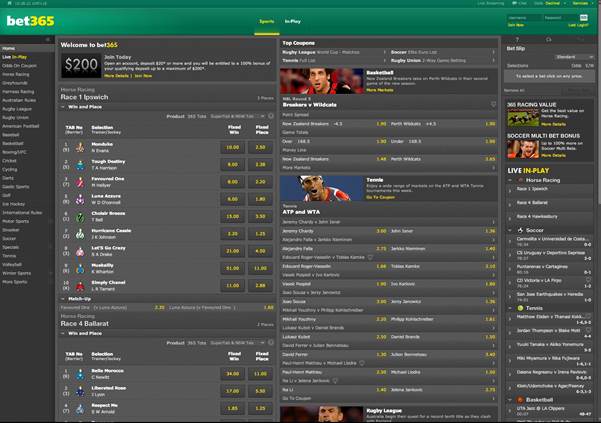
32 Displayed on this page, near the top left corner, was the following:
Screenshot 4

33 There was no other information about the FREE BETS Offer visible on this page.
34 By clicking on the "Join Now" link, the customer was taken directly to the Free Bets Open Account Page (see [36] to [39] below) and was thus able to proceed directly to register, pay a deposit for the FREE BETS Offer and commence gambling without clicking on the "More Details" link on this page.
35 By clicking on the "More Details" link, the customer was taken to the Free Bets More Details Page (see [46] to [49] below).
Free Bets Open Account Page
36 If the customer clicked on the "Join Now" link on the Free Bets Welcome Page, a new page popped up titled "bet365 Open Account" (Free Bets Open Account Page) as depicted below.
Screenshot 5
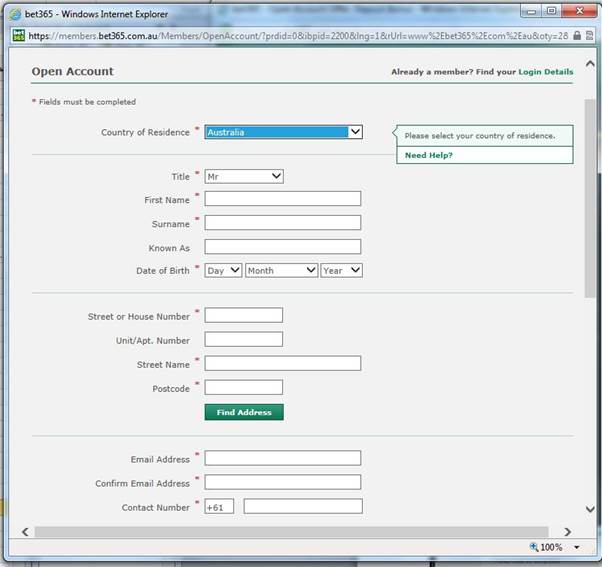
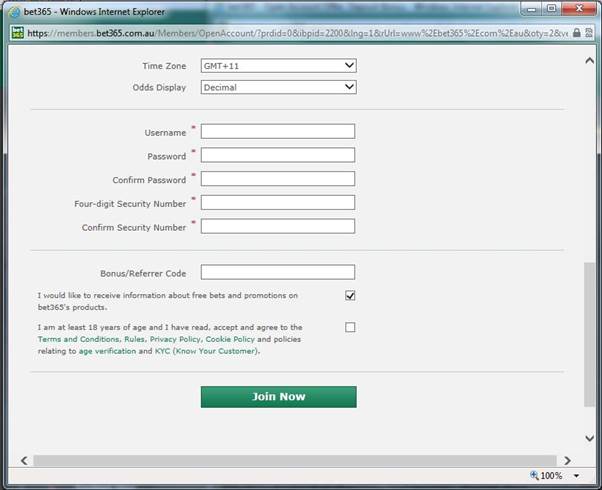
37 This page required the customer to enter his full name, birthdate, street address, email address and telephone number and to provide a username and password. There was also a pre-ticked box responding to the question "I would like to receive information about free bets and promotions on bet365's products", which the customer could opt to untick. There was also an unticked box next to the following statement:
"I am at least 18 years of age and I have read, accept and agree to the Terms and Conditions, Rules, Privacy Policy, Cookie Policy and policies relating to age verification and KYC (Know Your Customer)".
38 Neither the "Terms and Conditions" nor the "Rules" links contained information relevant to the Free Bets Offer and a customer could proceed to join by ticking this box, without clicking on those links.
39 After ticking this box and providing the required personal information in the Free Bets Open Account Page, the customer was then taken to a further page where they were asked to enter their preferred payment method details and if they would like to make a deposit as depicted below.
Screenshot 6
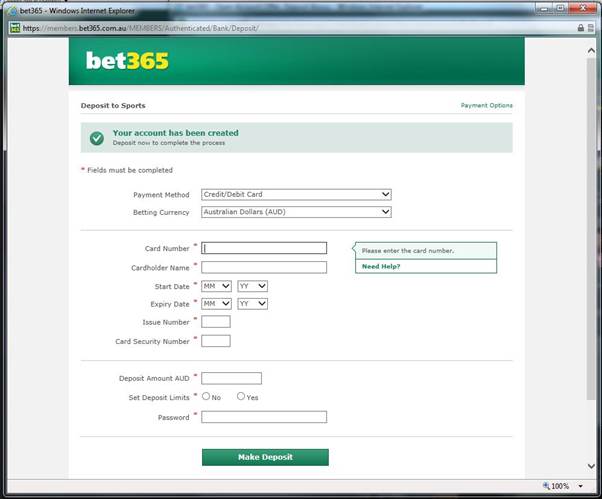
Free Bets Welcome Email
40 After providing the personal information required by the Free Bets Open Account Page, Hillside Australia sent the customer:
(a) an email (the Free Bets Welcome Email) as depicted in Screenshot 7 below; and
(b) a message in their inbox on the bet365.com.au Website as depicted in Screenshot 8 below.
Screenshot 7
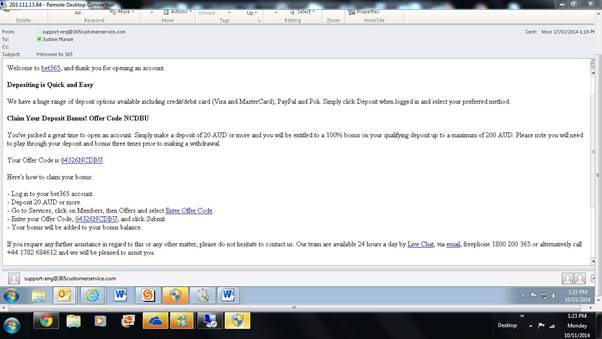
41 The Free Bets Welcome Email included the following statement:
Claim Your Deposit Bonus! Offer Code NCDBU
You've picked a great time to open an account. Simply make a deposit of 20 AUD or more and you will be entitled to a 100% bonus on your qualifying deposit up to a maximum of 200 AUD. Please note you will need to play through your deposit and bonus three times prior to making a withdrawal.
Your Offer Code is [code provided].
Here's how to claim your bonus:
- Log in to your bet365 account.
- Deposit 20 AUD or more.
- Go to Services, click on Members, then Offers and select Enter Offer Code.
- Enter your Offer Code, [code provided], and click Submit.
- Your bonus will be added to your bonus balance.
Screenshot 8

42 If the customer clicked on the link "Welcome to 365" in their inbox, the message depicted in Screenshot 9 would pop up.
Screenshot 9
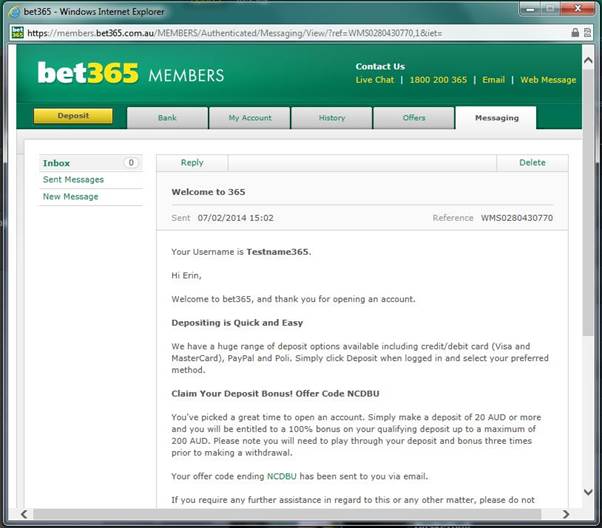
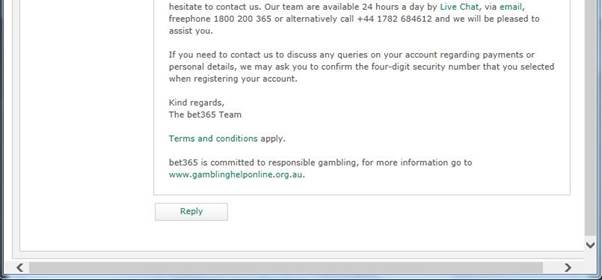
43 If the customer clicked on the link "Terms and Conditions" shown in Screenshot 9 above, the screen depicted in Screenshot 9C below would pop up. If the customer clicked on the "Offers" tab shown in Screenshot 8 above, the screen depicted in Screenshot 9A below would be presented.
Screenshot 9A
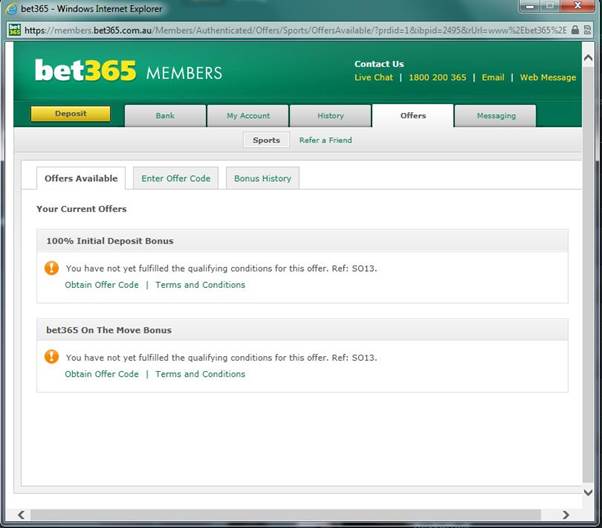
44 If the customer clicked on the link "Obtain Offer Code" under the heading "100% Initial Deposit Bonus" shown in Screenshot 9A, the screen depicted in Screenshot 9B below would pop up. If the customer clicked on the link "Terms and Conditions" under the heading "100% Initial Deposit Bonus" shown in Screenshot 9A, the screen depicted in Screenshot 9C below would pop up.
Screenshot 9B

Screenshot 9C
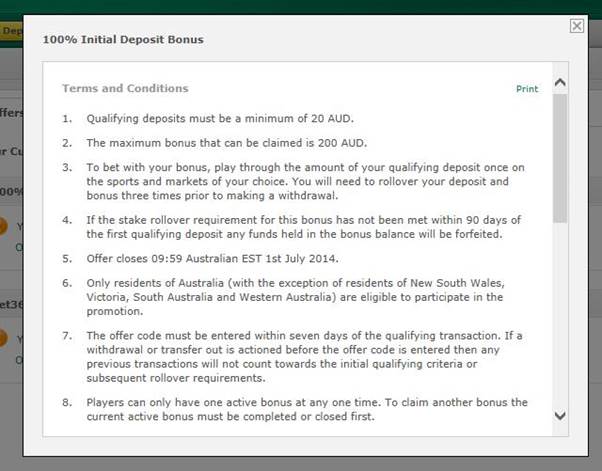
45 It was not necessary for the customer to view the email or the inbox message before making a deposit. However, in order to take up the Free Bets Offer, the customer needed to enter the offer code contained within the email.
Free Bets More Details Page
46 On the Free Bets Welcome Page, if a customer opted to click on the "More Details" link, a page popped up titled "100% Initial Deposit Bonus" (Free Bets More Details Page). The Free Bets More Details Page appeared as follows:
Screenshot 10
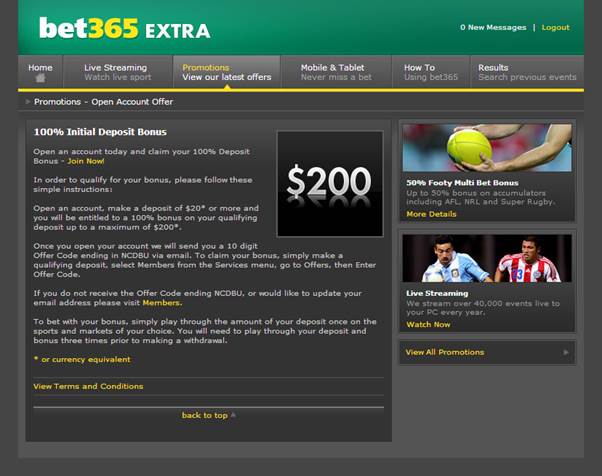
47 If the customer clicked on the "Join Now" link, he was taken directly to the Free Bets Open Account Page (see [36] to [39] above).
48 If the customer clicked on the "View Terms and Conditions" link, the Terms and Conditions were presented in full on that page, which extended beyond the size of the pop-up box. Depending on the size of their computer monitor and screen zoom settings, the customer would normally see conditions numbered 1 to 3 and would then need to scroll downwards or to expand the size of the box to read all of the text beyond term 3. There were 16 terms, displayed as follows:
Screenshot 11
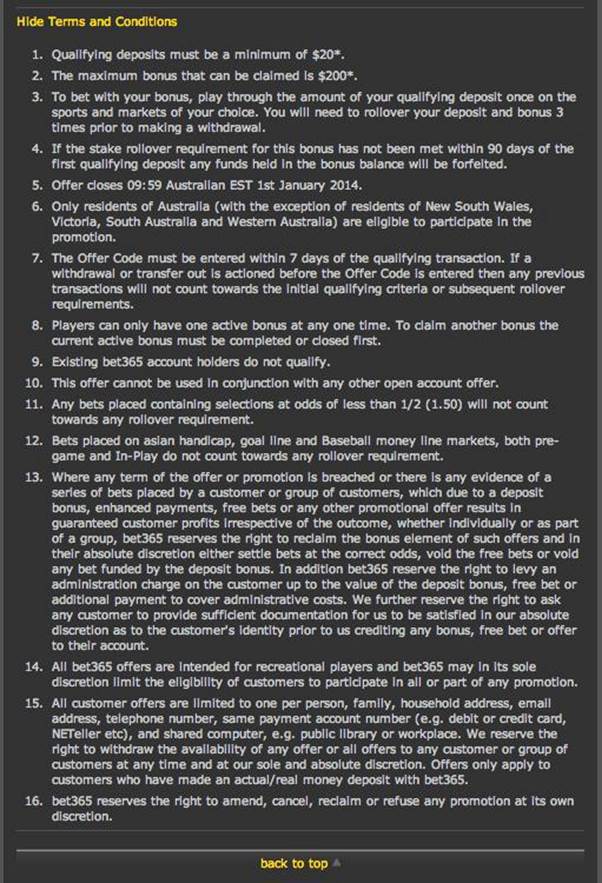
49 Once the customer completed the above steps and placed bets to the value of their initial deposit (up to $200), an amount equivalent to their initial deposit (up to $200) would have been transferred into the "Bonus" balance of their account, as indicated to them in Screenshot 12 and they would have received an email informing them that they could begin to bet with their Bonus amount (Screenshot 13).
Screenshot 12
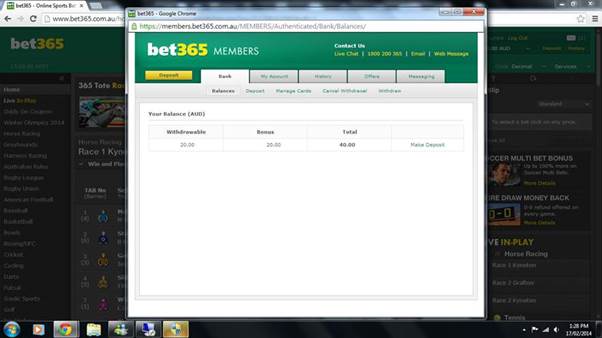
Screenshot 13
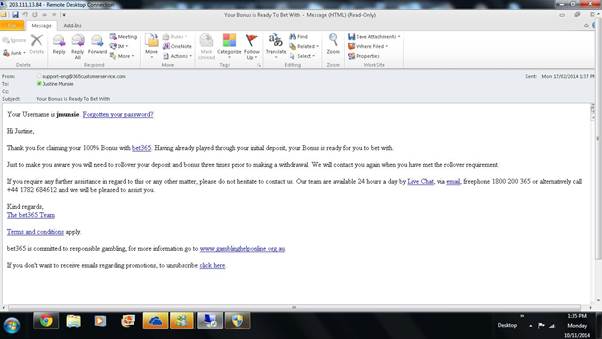
(c) DEPOSIT BONUS Offer from 30 January 2014 to 8 August 2014
Deposit Bonus Opening Page
50 From 30 January 2014 until 8 August 2014, consumers in Australia who accessed the bet365.com.au Website for the first time were taken to an opening webpage (the Deposit Bonus Opening Page) which displayed a number of customer offers, including an offer under the headline reading "$200 DEPOSIT BONUS FOR NEW CUSTOMERS*" and then from 18 February 2014, "UP TO $200 DEPOSIT BONUS FOR NEW CUSTOMERS" (together, the DEPOSIT BONUS Offer), as follows:
Screenshot 14
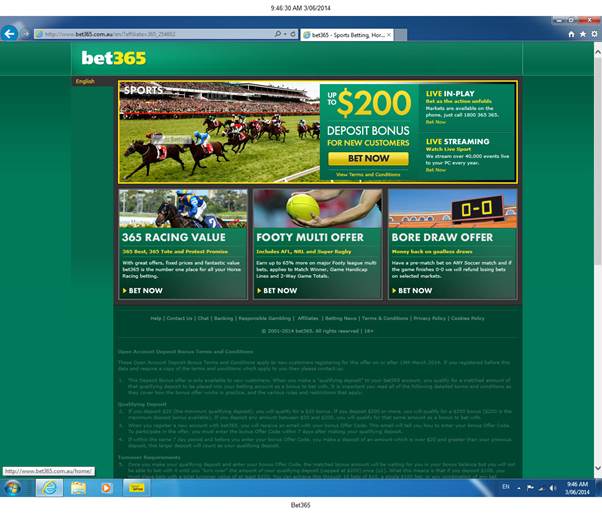
51 The bet365.com.au Website operated such that first time visitors to the website were directed to the Deposit Bonus Opening Page. The bet365.com.au Website was configured such that a cookie would normally be inserted onto the visitor's computer such that on their second or subsequent visits, they would be directed to the Deposit Bonus Welcome Page (described below). However, if the visitor had particular settings on their computer, such as those which disabled cookies, then they would be able to return to the Deposit Bonus Opening Page.
52 The top part of the Deposit Bonus Opening Page displayed the words "BET NOW" within a yellow rectangle, immediately beneath the headline offer "UP TO $200 DEPOSIT BONUS FOR NEW CUSTOMERS".
53 The words "*See Terms and Conditions below" and from 18 February 2014 "View Terms and Conditions" were displayed immediately underneath the words "BET NOW".
54 The terms and conditions of the Deposit Bonus Offer were displayed on the Deposit Bonus Opening page under the heading Open Account Deposit Bonus Terms and Conditions and were visible to any customer viewing the Deposit Bonus Opening Page. Depending on the size of their computer monitor and screen zoom settings, the customer would normally see the first part of the Terms and Conditions (Screenshot 14) and would then need to scroll downwards to see the remainder as set out below (Screenshot 15).
Screenshot 15
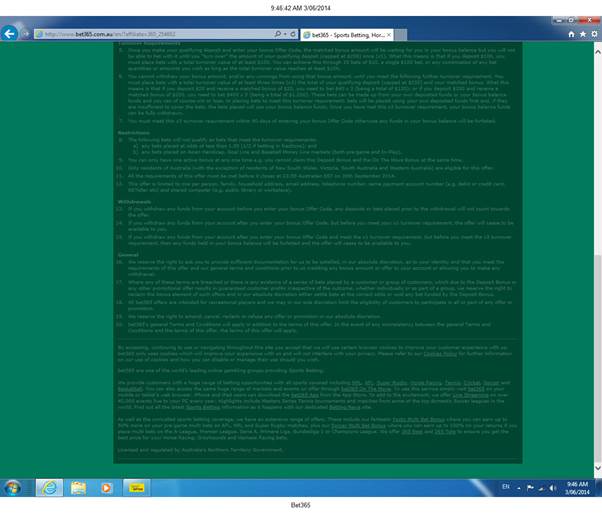
55 The Terms and Conditions shown in Screenshots 14 and 15 included the following conditions:
(a) clause 5: "5. Once you make your qualifying deposit and enter your bonus Offer Code, the matched bonus amount will be waiting for you in your bonus balance but you will not be able to bet with it until you "turn over" the amount of your qualifying deposit (capped at $200) once (x1). What this means is that if you deposit $100, you must place bets with a total turnover value of at least $100. You can achieve this through 10 bets of $10, a single $100 bet, or any combination of any bet quantities or amounts you wish as long as the total turnover value reaches at least $100".
(b) clause 6: "6. You cannot withdraw your bonus amount, and/or any winnings from using that bonus amount, until you meet the following further turnover requirement. You must place bets with a total turnover value of at least three times (x3) the total of your qualifying deposit (capped at $200) and your matched bonus. What this means is that if you deposit $20 and receive a matched bonus of $20, you need to bet $40 x 3 (being a total of $120); or if you deposit $200 and receive a matched bonus of $200, you need to bet $400 x 3 (being a total of $1,200). These bets can be made up from your own deposited funds or your bonus balance funds and you can of course win or lose. In placing bets to meet this turnover requirement, bets will be placed using your own deposited funds first and, if they are insufficient to cover the bets, the bets placed will use your bonus balance funds. Once you have met this x3 turnover requirement, your bonus balance funds can be fully withdrawn".
(c) clause 7: "7. You must meet this x3 turnover requirement within 90 days of entering your bonus Offer Code otherwise any funds in your bonus balance will be forfeited".
(d) clause 8a: "8. The following bets will not qualify as bets that meet the turnover requirements: a) any bets placed at odds of less than 1.50 (1/2 if betting in fractions)".
(e) clause 10: "10. Only residents of Australia (with the exception of residents of New South Wales, Victoria, South Australia and Western Australia) are eligible for this offer".
(f) clause 15: "15. If you withdraw any funds from your account after you enter your bonus Offer Code and meet the x1 turnover requirement, but before you meet the x3 turnover requirement, then any funds held in your bonus balance will be forfeited and the offer will cease to be available to you".
Deposit Bonus Welcome Page
56 A customer who clicked anywhere within the rectangle containing statements or images about the Deposit Bonus Offer on the Deposit Bonus Opening Page (with the exception of the words "View Terms and Conditions", for which see [60] below) was taken directly to a page headed "Welcome to bet365" (the Deposit Bonus Welcome Page), which appeared as follows in screenshots 16 and 17 (close up):
Screenshot 16

Screenshot 17

57 The Deposit Bonus Welcome Page provided two links in yellow text titled "More Details" (which was amended to read "Terms and Conditions" from on or about 18 February 2014) and "Join Now".
58 A customer who clicked on the "Join Now" link was taken directly to the Deposit Bonus Open Account Page described in [64] and [65].
59 A customer who clicked on the "More Details" link was taken directly to the Deposit Bonus Promotions Page described in [60] to [63].
Deposit Bonus Promotions Page
60 On the Deposit Bonus Opening Page, beneath the yellow rectangle reading "BET NOW" was another click-through link in smaller yellow print reading "View Terms and Conditions". A customer who clicked on that link was taken to a pop-up page titled "Promotions — Open Account Offer" (Deposit Bonus Promotions Page) which appeared as follows:
Screenshot 18
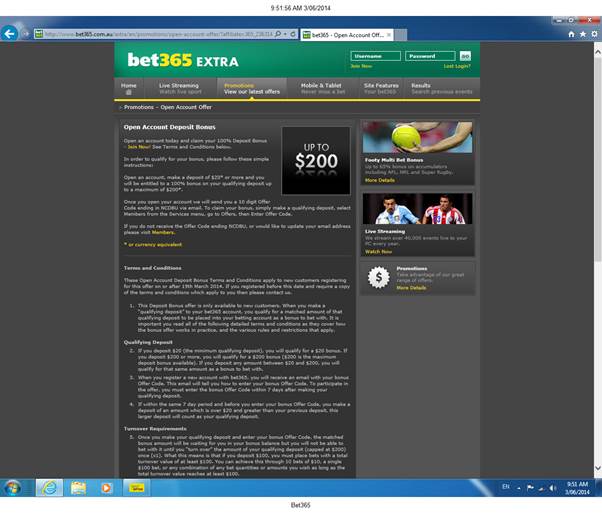
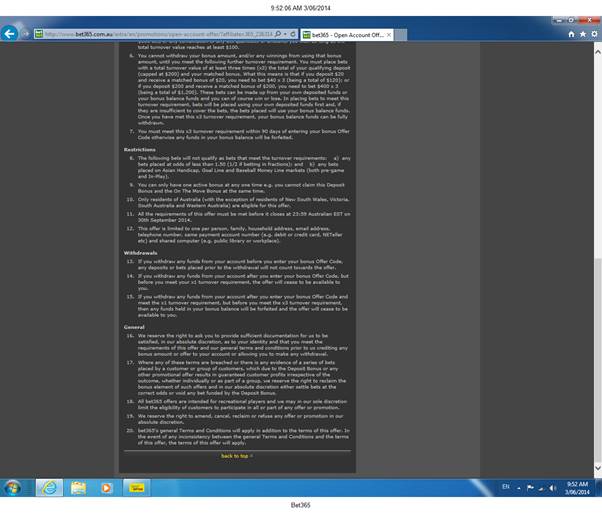
61 The Deposit Bonus Promotions Page contained text at the top which set out the following information:
Open an account today and claim your 100% Deposit Bonus – Join Now!
In order to qualify for your bonus, please follow these simple instructions:
Open an account, make a deposit of $20* or more and you will be entitled to a 100% bonus on your qualifying deposit up to a maximum of $200*.
Once you open your account we will send you a 10 digit Offer Code ending in NCDBU via email. To claim your bonus, simply make a qualifying deposit, select Members from the Services menu, go to Offers, then Enter Offer Code.
If you do not receive the Offer Code ending NCDBU, or would like to update your email address please visit Members.
To bet with your bonus, simply play through the amount of your deposit once on the sports and markets of your choice. You will need to play through your deposit and bonus three times prior to making a withdrawal.
* or currency equivalent
¯¯¯¯¯¯¯¯¯¯¯¯¯¯¯¯¯¯¯¯¯¯¯¯¯¯¯¯¯¯¯¯¯¯¯¯¯¯¯¯¯¯¯¯¯¯¯¯¯¯¯¯¯¯¯¯¯¯¯¯¯¯¯¯¯¯¯
Terms and Conditions,
below which were set out the terms and conditions of the Deposit Bonus Offer in full.
62 The Deposit Bonus Promotions Page appeared in a pop-up window. Depending on the size of their computer monitor and screen zoom settings, the customer would normally see Terms and Conditions numbered 1 to 5 and then was required to manually scroll down or to expand the size of the box to read the remainder.
63 The term "Join Now!" was rendered in yellow print as a click-through link. A customer who clicked on that "Join Now!" link was taken directly to the Deposit Bonus Open Account Page described in [64] and [65] below.
Deposit Bonus Open Account Page
64 Customers were taken directly to the Deposit Bonus Open Account Page by clicking on either of:
(a) the "Join Now!" link on the Deposit Bonus Welcome Page (see [56] to [59] above);
(b) the "Join Now!" link on the Deposit Bonus Promotions Page (see [60] to [63] above).
65 The Deposit Bonus Open Account Page looked the same and operated in the same way as the Free Bets Open Account Page as described in [36] to [39] above.
66 The Deposit Bonus Offer was removed from the bet365.com.au Website on 8 August 2014.
Legal Principles
67 Section 18 of the ACL provides:
18 Misleading or deceptive conduct
(1) A person must not, in trade or commerce, engage in conduct that is misleading or deceptive or is likely to mislead or deceive.
(2) Nothing in Part 3–1 (which is about unfair practices) limits by implication subsection (1).
68 Sub-sections 29(1)(b), (i) and (m) of the ACL provide:
29 False or misleading representations about goods or services
(1) A person must not, in trade or commerce, in connection with the supply or possible supply of goods or services or in connection with the promotion by any means of the supply or use of goods or services:
…
(b) make a false or misleading representation that services are of a particular standard, quality, value or grade; or
…
(i) make a false or misleading representation with respect to the price of goods or services; or
…
(m) make a false or misleading representation concerning the existence, exclusion or effect of any condition, warranty, guarantee, right or remedy (including a guarantee under Division 1 of Part 3–2); …
(a) Identifying the relevant consumers
69 In the present case the relevant class consists of users and potential users of online betting services throughout Australia. That class consists of new users of such services, those who have sometimes used such services and those who have been frequent users. It may be accepted that this class has some basic knowledge of how to use a computer and to navigate the web.
70 It is necessary to consider the effect of the conduct or representations upon ordinary and reasonable members of this class (see Campomar Sociedad, Limitada v Nike International Ltd (2000) 202 CLR 45 at [102] and [103] per Gleeson CJ, Gaudron, McHugh, Gummow, Kirby, Hayne and Callinan JJ; Google Inc v Australian Competition and Consumer Commission (2013) 249 CLR 435 at [6] to [9] per French CJ, Crennan and Kiefel JJ). This hypothetical construct avoids using the very gullible or the highly astute to assess effect or likely effect.
(b) Dominant message and fine print
71 In considering the hypothetical ordinary and reasonable member of the relevant class, one considers the dominant message conveyed (Australian Competition and Consumer Commission v TPG Internet Pty Ltd (2013) 250 CLR 640 (ACCC v TPG) at [20], [40] and [45] per French CJ, Crennan, Bell and Keane JJ). The question is whether there is a real rather than a remote possibility of the member of the relevant class being misled or deceived by the relevant conduct or statement. In the present context, does the relevant conduct or statement have a tendency to lead persons of the relevant class into error?
72 Conduct that exploits the mistaken views of members of the relevant class may be misleading or deceptive or likely to mislead or deceive and may not be corrected by any obscure fine print, whether in content, size or location, that sets out the true position.
73 In ACCC v TPG, French CJ, Crennan, Bell and Keane JJ at [51] analysed TPG's advertisements in terms:
The tendency of TPG's advertisements to lead consumers into error arose because the advertisements themselves selected some words for emphasis and relegated the balance to relative obscurity. To acknowledge ... that "many persons will only absorb the general thrust" is to recognise the effectiveness of the selective presentation of information by TPG.
74 Further, terms or conditions of particular offers that have significant advantage for the representor and disadvantage for the representee require due notice; see National Exchange Pty Ltd v Australian Securities and Investments Commission (2004) 61 IPR 420 at [56] and [57] per Jacobson and Bennett JJ. Further, as their Honours observed at [50], [51] and [55]:
[50] … A document which, when read as a whole, is factually true and accurate may still be capable of being misleading if it contains a potentially misleading primary statement which is corrected elsewhere in the document but without the reader's attention being adequately drawn to the correction.
[51] The principle which applies to those cases is that the qualifying material must be sufficiently prominent or conspicuous to prevent the primary statement from being misleading …
[55] Where the disparity between the primary statement and the true position is great it is necessary for the maker of the statement to draw the attention of the reader to the true position in the clearest possible way.
75 Finally on this aspect, in assessing the effect and significance of conduct that diminishes or relegates to obscurity information that is necessary to qualify or correct any dominant message, one looks at the relevant course of conduct as a whole in light of the surrounding facts and circumstances.
(c) Enticement into the marketing web
76 Even if the effect of relevant advertising is, or is likely to be, dispelled prior to any transaction being effected, it may still be misleading or deceptive. In ACCC v TPG at [50] it was noted that a contravention may occur, not only when a contract has been concluded under the influence of a misleading advertisement, but also at the point where members of the relevant class have been enticed into "the marketing web" by an erroneous belief engendered by an advertiser. Such a contravention may be established even if the consumer may later come to appreciate the true position before a transaction is concluded. The tendency of advertisements to mislead is to be determined not by asking whether they were apt to induce consumers to enter into contracts, but by asking whether they were apt to bring them into negotiation (ACCC v TPG at [48]). See also Tec & Tomas (Australia) Pty Ltd v Matsumiya Computer Company Pty Ltd (1984) 1 FCR 28 at 38, St Lukes Health Insurance v Medical Benefits Fund of Australia Ltd [1995] ATPR 41–428 at 40,823, Trade Practices Commission v Optus Communications Pty Ltd (1996) 64 FCR 326 at 338 to 340, Medical Benefits Fund of Australia Ltd v Cassidy (2003) 135 FCR 1 at [42] to [44], Australian Competition and Consumer Commission v Commonwealth Bank of Australia (2003) 133 FCR 149 at [63], Australian Competition and Consumer Commission v Telstra Corporation Ltd (2004) 208 ALR 459 at [58] and Australian Competition and Consumer Commission v Singtel Optus Pty Ltd (No 3) (2010) 276 ALR 102 at [6] and [19].
77 The question of whether conduct is misleading or deceptive is anterior to whether a person has entered into contractual relations. It is no answer that relevant consumers who signed up for the service or product could have been expected to understand fully the nature of their obligations by the time they actually became customers.
(d) Meaning of "free" and "bonus"
78 As to the word "free", in Fraser v NRMA Holdings Ltd (1994) 52 FCR 1 at 28A reference was made to its adjectival use to identify that which is given without consideration and as a gift (see also on appeal at (1995) 55 FCR 452 at 483F). In Nationwide News Pty Ltd v Australian Competition and Consumer Commission (1996) 71 FCR 215, Lindgren J stated, in the context of offers of "free" goods or services in commercial advertising, that apposite definitions of "free" were (at 225C):
"provided without, or not subject to, a charge or payment": The Macquarie Dictionary (2nd Revised ed), definition (26)
"Given or provided without charge or payment, gratuitous": The New Shorter Oxford English Dictionary (1993), definition (13)
79 He agreed with observations in Trade Practices Commission v Optus Communications Pty Ltd (1996) 64 FCR 326 at 338D that the word "free" has a particularly strong attraction and unless adequately qualified (where the context requires it) can produce a wrong understanding (see Nationwide News at 228E).
80 Lindgren J stated (at 228F):
While each case turns on its own facts, the cases to which I have referred demonstrate judicial recognition of the propensity of the word "free" in advertising to mislead or deceive. An advertiser relies on common understandings at its peril. Any respect in which goods or services offered as "free" may not be free should be prominently and clearly spelled out so that the magnetism of the word "free" is appropriately qualified.
81 But it is important to look at the entirety of the words and in context. To select and focus upon a particular word in isolation is inappropriate. In context, the word "free" or figure "$0", when assessed within the entirety of all words used and the totality of the conduct, may not amount to a $0 representation or a "free" representation (see for example ACCC v Telstra at [53]).
82 As to the word "bonus", its meaning and connotations are more nuanced than the word "free". A "bonus" can mean:
(a) "something given or paid over and above what is due": The Macquarie Dictionary (2nd Revision), definition (1);
(b) "Something, esp. money, over and above that which is normally expected": The New Shorter Oxford English Dictionary (1993), definition (1).
To use such a word invites questions such as "bonus on what?" or "bonus for what?" or "bonus of what type?" No doubt the word invokes something that is worth having or advantageous. But it invites questions of what it is and what you need to do to get it. And to so invite such questions may then invite, if not necessitate, further enquiry. A consumer is likely to understand that a bonus may have conditions attached if only to identify what it is and how you get it, although not such as to render the bonus illusory in value or unattainable by reasonable steps within a reasonable time (depending upon the precise context) on his part.
(e) Prohibitions in Victoria, NSW, SA and WA against inducements to open betting accounts
83 The following legislation in Victoria, New South Wales, South Australia and Western Australia at the relevant time prohibited betting companies from offering inducements to consumers to open a betting account:
(a) In Victoria, s 4.7.10 of the Gambling Regulation Act 2003 (Vic) provided:
4.7.10 Offence to offer inducement to open betting account
A wagering service provider must not offer any credit, voucher or reward as an inducement to open a betting account.
(b) In New South Wales, reg 12 of the Racing Administration Regulation 2012 (NSW) provided:
12 Prohibitions on gambling-related advertising
(1) A non-proprietary association or licensed wagering operator, or an employee or agent of a non-proprietary association or licensed wagering operator, must not publish any gambling advertising:
…
(h) that offers any credit, voucher or reward as an inducement to participate, or to participate frequently, in any gambling activity (including as an inducement to open a betting account).
(c) In South Australia, cll 6A and 11 of the Responsible Gambling (Authorised Interstate Betting Operators) Code of Practice 2009 (SA) (a code prescribed under ss 6A(1)(b) and 62C of the Authorised Betting Operations Act 2000 (SA), but revoked from 1 March 2014) provided:
6A. Inducements
The gambling provider must not offer any inducement to gamble.
11. Definitions and interpretation
(1) In this code—
…
"inducement to gamble" means any inducement designed to encourage a person to establish a gambling account, and includes an inducement in the nature of—
(a) a credit, voucher, reward or rebate; and
(b) any other valuable consideration—
but does not include a trade promotion lottery. …
(d) In Western Australia, reg 43 of the Gaming and Wagering Commission Regulations 1988 (WA) provided:
43. Certain advertising prohibited
…
(2) A person must not publish, or cause to be published, an advertisement in this State that conveys, or is likely to be understood as conveying, the existence in this State or elsewhere of a gambling operator if the advertisement—
…
(e) offers a benefit, consideration or reward in return for the person—
(i) participating in gambling; or
(ii) continuing to gamble; or
(iii) opening a betting account with the operator; or
(f) contains an express or implied inducement for a person to contact the gambling operator; …
84 But notwithstanding these legislative restrictions, the evidence demonstrated that if a new customer entered any Australian residential address at the point depicted in Screenshot 5 as shown earlier (see at [36]), the customer could participate in the offer. The ACCC advanced a case that not to disclose or make sufficiently prominent the conditions of both types of offers that excluded residents of Victoria, New South Wales, South Australia and Western Australia from eligibility was misleading or deceptive. But in light of this evidence, this case was not seriously pressed by the ACCC.
Analysis
85 As a preliminary matter, it is appropriate to observe the following features relating to the presentation of information on a web page:
(a) First, parts of a page can be enlarged if a reader so chooses.
(b) Second, information at the bottom of a page can be easily scrolled down to.
(c) Third, even if lighter or darker shades of the same colour are used, when viewing a page on a screen, as distinct from reading a printed hard copy, different lighting properties of the screen may accentuate the contrast rather than diminish it.
(d) Fourth, different colours may have different influences. All else being equal, the lighter colours may have greater impact. Further, the more luminescent a particular colour, the greater its effect. Equally, darker or less luminescent colours may have the tendency to diminish significance or to make information unattractive to read. More generally, the colour may be designed to be in sympathy with the activity displayed, producing a visual harmony with the concept displayed. Further, the colour may seek to evoke an emotional engagement.
(e) Fifth, how the page is divided into sections may have an important influence in emphasising or diminishing the significance of information displayed on a particular part.
(f) Sixth, how the page displays related information will be important. For example, the words "Bet Now" next to "View Terms and Conditions" presents a different significance, prominence and access to the relevant terms and conditions than if the phrases were significantly apart.
(g) Seventh, different sizes of type-face used for different messages may influence how a reader prioritises information, for example, giving more significance to the larger sizes (e.g. upper casing) whilst diminishing the significance of the lesser sizes (e.g. lower casing). Further, the style of the font may have an influence.
(h) Eighth, visual images such as photographs, videos or diagrams that are more easily and appealingly viewed may tend to distract the reader's eye from focusing upon, let alone reading, the written word. In general, material requiring less intellectual effort to process is more likely to be prioritised by the reader than material that is more challenging.
(i) Ninth, the configuration of a page may be designed to present options to the reader in a manner that influences and allows the reader to seek out and get to the more desired option more quickly (i.e. placing a bet) rather than the less desired option (i.e. reading turgid and numerous terms and conditions). The more desired option would usually be the option that satisfies both the advertiser's preferred option to maximise profit and the reader's desired option to obtain the maximum benefit for the least effort and outlay.
(j) Tenth, a web page does not have the transitory qualities of a television or radio advertisement. The reader of such a page usually has as much time as he likes to view and digest whatever information on that page he is interested in. The design of a web page is more to attract interest in or deflect interest from particular matters, including influencing the reader to limit his time on aspects that the advertiser does not wish to highlight. But the medium, unlike a television or radio advertisement, is not time limiting unless programmed limits are directly imposed (e.g. the time to complete an electronic transaction or to take up an offer).
(a) FREE BETS Offer (18 March 2013 to 30 January 2014)
86 In my view, the FREE BETS Offer and its promotion prior to 14 January 2014 involved misleading or deceptive conduct and false or misleading representations on the part of Hillside Australia and Hillside UK. The dominant message of "free bets" was misleading or deceptive and contained a false representation. Moreover, the dominant message was not appropriately and proportionately qualified by the applicable terms and conditions.
87 The headline offer "$200 FREE BETS FOR NEW CUSTOMERS*" conveyed that new customers would be entitled to $200 of free bets without limitation or restriction or at least without the limitations or restrictions set out in the next paragraph. Further, none of the key conditions were displayed on the Free Bets Opening Page prior to 14 January 2014.
88 Notwithstanding this digital headline, the following conditions applied to the "Free Bets":
(a) The customer had to pay a deposit and risk that deposit before being entitled to make any "free" bet.
(b) The customer had to risk the value of his deposit and the amount of the "free" bet three times prior to making a withdrawal.
(c) The offer was not available for bets at odds less than 1/2 ($1.50 return for a $1 bet).
(d) The amount of the "free" bet and any winnings from any "Free Bet" were to be forfeited unless the customer risked the value of his deposit and the amount of the "free" bet three times within 90 days.
(e) The value of the "FREE BET" was limited by the size of the customer's first deposit.
(f) Residents of Victoria, NSW, SA and WA were not eligible for the offers.
89 Beneath the headline "$200 FREE BETS FOR NEW CUSTOMERS*" appeared the words "BET NOW" within a yellow rectangle. A customer who clicked anywhere within the rectangle containing statements or images about the FREE BETS Offer on the Free Bets Opening Page was taken to the Free Bets Welcome Page headed "Welcome to bet365". That page displayed the statement "Open an account, deposit $20* or more and you will be entitled to a 100% bonus of your qualifying deposit up to a maximum of $200*". Importantly, it did not display any further terms of the FREE BETS Offer.
90 To discern the relevant terms of the FREE BETS Offer, the customer was required to investigate a series of optional click-throughs to other pages as I have set out earlier at [34] to [39] and [46] to [49]. Any customer who managed to find those terms had by that stage been fully drawn into the marketing web by the headline offer.
91 The ACCC tendered complaints of customers received by the respondents relating to the FREE BETS Offer. Of course, to establish its case, it did not need to establish that anyone was actually misled.
92 A selection of the complaints received during the period May 2013 to December 2013 appeared to demonstrate that customers had responded to the FREE BETS Offer without understanding the existence or effect of the applicable terms and conditions. For example, a customer complained that his bonus had been withdrawn. It was explained to him that "All bonuses have an expiry period of 90 days". His response was: "I was not warned or aware of any such policy". There were similar complaints about the 90 day expiry ("when I joined there was no mention of an expiry" and "Apparently my bonus bet expired? I don't remember anybody telling me there was a specific period I had to use the free bet within?"). There was a complaint of a customer who was not sufficiently notified of the limitation to bets of odds over 1.5 ("but I wanna play on Andy Murray and Djokovic they both have odds less than 1.5 this is not fair at all"). Further, a complaint made by another customer demonstrated that the customer may not have been sufficiently notified of the rollover requirements. Further, there was a complaint demonstrating that a customer was not sufficiently notified of the term requiring him to place qualifying bets to the full amount of his deposit before he could place bets with his bonus balance. Further, there was a complaint of a customer that he was not sufficiently notified of the term that the value of the "FREE BETS" was limited by the size of his first deposit.
93 The respondents contended that to the extent to which an enquiry revealed that a customer was not aware of a particular term, this did not necessarily mean that the customer was misled. Rather, it might suggest that there were customers who chose not to inform themselves of the conditions. There is some force in these contentions.
94 I must say that I found evidence concerning these complaints to be of limited assistance. But in any event, even without recourse to such evidence, the misleading effect of the dominant message of free in the headline "FREE BETS" is clear.
95 The respondents have gone so far as to suggest that the present case is not one in which the dominant message was misleading or deceptive. It is said that new customers could obtain $200 of free bets. It is said that provided that they made a $200 deposit and used that amount to make bets, they were able to bet with money provided by the respondents rather than by themselves. It was said that this was properly described as a "free bet". I must say that I found the respondents' analysis and characterisation artificial.
96 The respondents stressed that it must be borne in mind that the customers of the bet365 service were people who wished to gamble. They deposited money in order to use that money to place bets, and thus it was said that a requirement to bet the amount of the deposit prior to obtaining the free bets was hardly surprising.
97 Moreover, evidence was filed suggesting the commonality at the relevant time of advertising for internet sports betting using phrases such as "free bets", "deposit bonus" and the like. Such advertising had appeared on websites such as "sportingbet.com.au", "centrebet.com.au", "tomwaterhouse.com.au", "betfair.com.au", "ladbrokes.com.au", "unibet.com.au", "tab.com.au", "sportsbet.com.au" and "luxbet.com". But I do not consider that this evidence greatly assists the respondents. First, such advertising does not speak to the question of how such phrases may have been understood by new users of such services. Second, it is difficult to see what one can take from such general advertising. Each site and advertising was slightly different, particularly in terms of the qualifications, terms and conditions (including how they were digitally accessed) and the prominence given to such matters on the particular web site. Third, at most, all that one can say is that many of the frequent users of such services (but not all) were likely to understand that nothing was for free and that they needed to review the terms and conditions if they were at all interested in the qualifications.
98 In relation to any qualification to the dominant message, the respondents have emphasised the use of an asterisk on the Free Bets Opening Page. The relevant part of the Free Bets Opening Page contained the following words:
$200
FREE BETS
FOR NEW CUSTOMERS*
BET NOW
99 It is said that the use of an asterisk after the words "For New Customers*" involved the use of a commonplace technique for indicating that the offer was subject to certain conditions or qualifications. It is said that customers would have been alerted to the fact that there were some conditions or qualifications. But whether an asterisk leading to a qualification of a representation is effective to neutralise otherwise misleading or deceptive conduct depends on the particular circumstances, including where the qualifying material can be found and its ease of access (see Medical Benefits Fund at [37] to [41]); the prominence of the asterisk and the prominence and availability of the qualifying information all need to be considered, with the necessary degree of prominence to dispel the misleading character of the dominant message being a directly proportional function of the strength of the effect of the dominant message in terms of the impression that it is likely to have created. In the present case, and unlike the other advertisements, the terms and conditions were not contained on the same webpage. Further, on the Free Bets Opening Page prior to 14 January 2014, the asterisk was an orphan; it was not referenced to and was disconnected from the terms and conditions.
100 It is true that if the customer proceeded from the Free Bets Opening Page by clicking on the link in the Free Bets offer, then the customer came to the main page for the website which was the Free Bets Welcome Page. Under the heading "Welcome to bet365", the customer was given some further information (including that any bonus was matched to the size of the opening deposit "up to a maximum of $200"), and was then immediately presented with two links:
More Details | Join Now
101 A customer who clicked on "More Details" was taken to a page that contained the relevant terms and conditions (including by clicking on a button to expand the page). The respondents have contended that the path to the terms and conditions was "short and obvious". But I agree with the ACCC's description that the digital pathway through to the terms and conditions was in some respects complicated and problematic.
102 Of course, a customer might choose not to obtain "More Details". There are situations in which customers could choose not to read terms and conditions, knowing that they were available. But such a possibility does not avail the respondents to establish no contravention when one considers the breadth of the class and the standard used to assess the effect or likely effect of conduct.
103 Further, to the extent that the respondents have sought to argue that other providers of similar services have done no more than what the respondents have done in setting up and using home pages for their websites where the terms and conditions were not readily available, there are two answers. First, one cannot so generalise from the information provided. Second, even if that conclusion was open, that does not establish that the respondents have not engaged in misleading or deceptive conduct. The other providers may have as well. Generally, this material only has relevance to informing me as to how the respondents' advertising the subject of the present proceeding could be viewed by a relevant member of the class to whom it was directed.
104 In my view, the FREE BETS Offer and its promotion was misleading or deceptive and also constituted the making of a false representation. Moreover, the relevant class that would have been affected or likely to have been affected not only included new users of such services but also some customers who may have used such services before of other providers. There are three other matters that I should deal with on this aspect of the case.
105 First, in terms of the contraventions, the respondents contended that even accepting the ACCC's characterisation of the facts, the conduct concerning the FREE BETS Offer did not fit within any of ss 29(1)(b), (i) or (m) of the ACL. I can dispose of these points shortly and conveniently in reverse order. First, in relation to s 29(1)(m), there was a false or misleading representation concerning "the effect of any condition" (my emphasis). Given the dominant message and the relegation and downplaying of the terms and conditions, there was a false or misleading representation as to the existence, alternatively the ambit and significance, of the terms and conditions. Second, in relation to s 29(1)(i), saying something is for "free" amounts to a statement of a $0 price. In my view, there was a false or misleading representation with respect to price given the dominant and misleading message of "free". Third, in relation to s 29(1)(b), the concept of "value" would be affected by something being for "free" with or without associated terms and conditions. By the dominant message of "free" and the downplaying, to say the least, of the terms and conditions, the cumulative effect amounted to a false or misleading representation concerning "value".
106 Second, on this part of the case, the respondents raised a pleading point. They contended that the ACCC's case had only been put on the basis that the relevant representation from the FREE BETS Offer was that it was without any limitation or restriction. But I do not consider that the case was so narrowly put. In my view the case was also put that the FREE BETS Offer was without any limitation or restriction of the type set out in [88] above. Related to this aspect, the respondents contended that it was obvious that there was at least one condition to the offer. But making an assumption in the respondents' favour to this effect, that does not address the breadth of the restrictions detailed in [88]; moreover, it is not established that a consumer knowing one condition would then proceed to identify all.
107 Third, from 14 January 2014 until 30 January 2014, the Free Bets Opening Page had the words "*See Terms and Conditions below" immediately below the words "BET NOW", and the terms and conditions of the offer were displayed (albeit in small green type on a green background at the bottom of the page) in full on the Free Bets Opening Page. In relation to this period, the position is very similar to the position for the DEPOSIT BONUS Offer. The offer was subject to terms and conditions, and the terms and conditions were prominently set out on the same page as the offer was made. In my view, from 14 January 2014 to 30 January 2014 there was no misleading or deceptive conduct engaged in or false representations made in relation to the FREE BETS Offer.
(b) DEPOSIT BONUS Offer (30 January 2014 to 8 August 2014)
108 In my view, the respondents did not engage in misleading or deceptive conduct or make false representations concerning the DEPOSIT BONUS Offer.
109 The dominant message conveyed by the DEPOSIT BONUS Offer was that new customers were entitled to a deposit bonus of up to $200 for placing bets.
110 In my view there was nothing misleading or deceptive concerning the representation, and nor was it a false representation. New customers were able to obtain a bonus amount to bet with of up to $200 (matching their initial deposit up to $200). The present case is not one where the dominant message was incorrect and some further disclosure had to be relied upon to render it accurate. New customers could readily obtain a deposit bonus, and the deposit bonus matched their original deposit up to $200. But there were conditions that had to be satisfied. Customers had to bet the value of their initial deposit in order to obtain a bonus. They could then bet with their bonus and accrue winnings. They therefore obtained a bonus in connection with their deposits. The "bonus" in the advertisement was undefined. But customers could obtain a "bonus" (and indeed a bonus matching the deposit) by these means. In my view, the ACCC fails at this step. The dominant message was not misleading. But in any event, the dominant message was appropriately qualified by the terms and conditions which were adequately displayed.
111 The following conditions applied to the Deposit Bonus offer:
(a) The customer had to pay a deposit and risk that deposit before being entitled to use any "bonus" deposit for placing bets.
(b) The customer had to risk the value of his deposit and the amount of the "bonus" deposit three times prior to making a withdrawal.
(c) The offer was not available for bets at odds less than 1/2 ($1.50 return for a $1 bet).
(d) The amount of the "bonus" deposit and any winnings from the "BONUS DEPOSIT" were forfeited unless the customer risked the value of his deposit and the amount of the "bonus" deposit three times within 90 days.
(e) Residents of Victoria, NSW, SA and WA were not eligible for the offers.
112 In the DEPOSIT BONUS Offer, the terms corresponding to the "Key Offer Terms" of the current OPEN ACCOUNT OFFER were set out in clauses 5, 6, 7, 8a, 10 and 15 contained within 20 terms and conditions which were rendered in small font and in light green text against a dark green background at the bottom of the Deposit Bonus Opening Page. The small font size and green colour of those terms and conditions were less prominent than the headline offer "UP TO $200 DEPOSIT BONUS FOR NEW CUSTOMERS" displayed at the top of the page, which was rendered in yellow and white against a green background, in much larger fonts. Moreover, a consumer had to scroll manually down the page to see all the relevant terms and conditions, or click-through a "Terms and Conditions" link which appeared in small, yellow font at the top of the Deposit Bonus Opening Page underneath the headline. Nevertheless, I consider that the terms and conditions were adequately displayed.
113 The ACCC has contended that the headline offer "UP TO $200 DEPOSIT BONUS FOR NEW CUSTOMERS" displayed at the top of the page in large yellow and white letters enticed consumers into the "marketing web". It asserts that by the time any consumer took the time and effort and managed to discern any of the key terms contained within the 20 closely typed terms and conditions at the bottom of the webpage, or on a click-through page, they had been well and truly enticed into Bet365's "marketing web". Generally, the ACCC has contended that none of the terms and conditions were displayed with sufficient prominence. I disagree.
114 First, the text of the relevant advertisement on the Deposit Bonus Opening Page was as follows:
UP TO $200
DEPOSIT BONUS
FOR NEW CUSTOMERS
BET NOW
View Terms and Conditions
115 The relevant terms and conditions appeared on the same page. Alternatively, if the customer clicked on "View Terms and Conditions", they were taken to another page on which the terms and conditions, identical to those set out on the Deposit Bonus Opening Page, were again readily viewable. Between 30 January 2014 and 18 February 2014, the words "*See Terms and Conditions below" appeared in place of "View Terms and Conditions" on the Deposit Bonus Opening Page.
116 Second, for the class of consumer who was unfamiliar with "Deposit Bonus" offers, the words "Deposit Bonus" did not have any immediate or fixed meaning independent of some further detail or explanation. The words suggested that the customer could receive a bonus of some description associated with making a deposit. Further, the words "Up to $200" suggested that the bonus had a maximum of $200, but could be any lesser sum. Further, the words also suggested that different customers could receive different bonuses. An ordinary and reasonable member of the relevant class could have been expected to and needed to enquire further as to what the bonus was and how it could be obtained. In my view that necessitated ascertaining the terms and conditions.
117 A customer who wanted to know how the "Up to $200 Deposit Bonus" worked could read the terms and conditions displayed on the same page. Now a customer might choose not to read the terms and conditions. But the fact that a consumer is not aware of a condition because the consumer has chosen not to read the condition is a matter for him. It does not establish any contravention.
118 Third, as to complaints, there were communications from customers suggesting that they were unclear as to how the bonus became available and could be used. But I repeat what I said earlier in relation to the probative value of customer complaints. Their lack of understanding does not establish necessarily that the respondents engaged in misleading or deceptive conduct.
119 In summary, the statement "Up to $200 Deposit Bonus for new customers" was not misleading or deceptive and did not amount to any false representation.
(c) Current position
120 The FREE BETS Offer and the DEPOSIT BONUS Offer may be contrasted with the OPEN ACCOUNT OFFER currently displayed on the bet365.com.au Website.
121 The current bet365.com.au Website displays the following "Key Offer Terms" in the central part of the opening webpage in white text against a black background:
(a) "This offer is not available to residents of Vic, NSW, SA and WA."
(b) "You must bet the amount of your qualifying deposit once before being able to bet with your bonus."
(c) "You must have settled bets to the value of three times your qualifying deposit and bonus before making a withdrawal."
(d) "Bets which do not contain at least one selection at odds of 1.50 or greater do not count towards any turnover requirement."
(e) "You will not be able to withdraw your bonus and/or winnings generated from your bonus if you have not completed the turnover requirements within 90 days of entering your bonus Offer Code."
122 The ACCC has contended that the presentation of these "Key Offer Terms" in the current OPEN ACCOUNT OFFER, in the central part of the opening webpage in white text against a black background, stands in contrast to the manner of presentation of those terms as displayed in the preceding DEPOSIT BONUS Offer and FREE BETS Offer. That may be so, but the relevance of the current presentation mode to the issues that I have to decide is questionable. All that it shows is what could have been done earlier. It does not by any necessary implication demonstrate that what was done earlier was misleading or deceptive.
(d) Activities of Hillside Australia and Hillside UK
123 Hillside Australia has made admissions concerning its role in conducting the FREE BETS and DEPOSIT BONUS Offers on the bet365.com.au Website.
124 Further, as I have said earlier, Hillside UK provided marketing, IT support, website infrastructure, software development, customer support and management support services to Hillside Australia for the purposes of developing and maintaining the bet365.com.au Website.
125 Its design and publishing department was responsible for:
(a) the marketing of the FREE BETS and DEPOSIT BONUS Offers together with Hillside Australia;
(b) setting the value of the FREE BETS and DEPOSIT BONUS Offers; and
(c) the preparation of promotional material for the FREE BETS and DEPOSIT BONUS Offers.
126 Its international development department and the legal department were responsible for the development of the terms and conditions of FREE BETS and DEPOSIT BONUS Offers. Its design and publishing department and its information technology department were jointly responsible for the design of the bet365.com.au Website, including site architecture, and its software development department was responsible for the modification of the bet365.com.au Website. Its customer services department was responsible for customer inquiries or complaints. Its international development department, its IT and information compliance department and its legal department were jointly responsible (along with the marketing department) for compliance.
127 Further, Mr Jamie Davenport, a training officer employed by Hillside UK, gave evidence concerning the training of staff of Hillside Australia. That evidence was also quite consistent with the operational status and involvement of Hillside UK in the relevant conduct, as opposed to Bet365GL.
(e) Position of Bet365GL
128 The ACCC has contended that the representations made by the FREE BETS and DEPOSIT BONUS Offers were also made by Bet365GL. It is said that they were made by Hillside Australia and Hillside UK on behalf of, and as agent for, Bet365GL. In other words, the ACCC contends that Bet365GL is liable as a principal contravener. The ACCC does not put a case based upon accessorial liability.
129 The ACCC emphasises the following matters.
130 First, Bet365GL is the parent company of a global group of companies (the bet365 Group) which trades under the name "bet365" and uses the website "bet365.com" and local derivations of that domain name. The bet365 Group promotes itself in Australia as "THE WORLD'S BIGGEST ONLINE BETTING COMPANY. NOW IN AUSTRALIA". The bet365 Group serves customers in 200 countries.
131 Second, the bet365 Group tries to ensure that the architecture and look and feel of its websites are as common and consistent as possible throughout the world.
132 Third, in the majority of those countries in which the bet365 Group offers its services, open account incentives are offered via its websites. The terms and conditions of the open account incentives published on the bet365 Group's webpages "are materially the same across the world and, when introduced in a new jurisdiction, the only changes made to the local website are those required by local law". For example, "Free Bets" offers for new customers were made in the UK and other countries in 2011. Mr Davenport also confirmed that the group's open account incentives were usually offered via its websites and that the architecture and look of such websites were common and consistent throughout the world and that the terms and conditions of open account incentives were similar. He also accepted that the group adopted a similar look and feel in the way it presented "free bet" offers.
133 Fourth, Bet365GL is and has at all material times been licensing and authorising Hillside Australia's use of the "bet365" trade mark and the "bet365.com.au" domain name.
134 Fifth, Bet365GL is the ultimate parent and controlling entity of Hillside Australia and has been providing ongoing financial support to Hillside Australia, including by way of an intercompany loan payment to a common controlled company of at least $48,974,000, which will not be required to be repaid until such time as there are sufficient cash flows generated by Hillside Australia. Further, Hillside Australia does not have any contractual arrangement directly with affiliates. Rather, such matters are dealt with between Bet365GL and the affiliates, with affiliate relationships being managed by Hillside UK.
135 Sixth, the representations made by the FREE BETS and DEPOSIT BONUS Offers were made in the name of "bet365" which was promoted as "THE WORLD'S BIGGEST ONLINE SPORTS BETTING COMPANY. NOW IN AUSTRALIA". The "bet365" logo appeared on the website. The name "bet365" appeared numerous times on the website. There was no mention of the name of the local subsidiary. The ACCC contends that a consumer looking at the website would be entitled to assume, and would most likely assume, that the offer was made by the parent company of the bet365 Group, being the company with bet365 in its name, rather than by an unnamed local subsidiary. The ACCC contends that the website seems designed to lead to that assumption. It is said that this is no doubt to assist in attracting the consumer's custom. Customers in Australia were directed by advertising for bet365 to the bet365.com website, and were automatically redirected to the bet365.com.au website.
136 It is said that this is not a situation where a trade mark has been licensed to a third party which is at arms' length. Rather, Bet365GL licensed and authorised its subsidiaries to use the trade mark and domain name in circumstances where the bet365 Group operates as a group, promotes itself as a single entity and offers open account incentives all round the world under the "bet365" name and with a similar look and feel.
137 Seventh, the ACCC also says that it is to be inferred that Bet365GL was aware of the fact that the bet365 Group promoted itself as the world's biggest online sports betting company and that the group offered open account incentives under the "bet365" name on websites around the world.
138 Eighth, the ACCC points to the fact that at all relevant times, Hillside UK and Bet365GL shared an identical board of four directors: Denise Coates, John Coates, Peter Coates and William Roseff. Further, at all relevant times, Stephen Sweeney, the General Counsel for Hillside UK was also General Counsel or In-house Solicitor for Bet365GL. He was notified from 18 April 2013 of Australian regulatory complaints about the advertising of FREE BETS Offers.
139 Ninth, the ACCC contends that the respondents have adduced no evidence from Mr Sweeney, from any of the four board members of Hillside UK and Bet365GL or from any other officer of Bet365GL addressing the question of Bet365GL's responsibility for the publication of the FREE BETS and DEPOSIT BONUS Offers in Australia. The unexplained failure by Bet365GL to call any evidence allows an inference that the uncalled evidence would not have assisted Bet365GL's case.
140 In my opinion, the ACCC has not made out its case against Bet365GL that it was a principal contravener.
141 First, the fact that Bet365GL was the parent company of a global group or that it was the ultimate parent and controlling entity of Hillside Australia does not establish Bet365GL's liability. That is to confuse share ownership and conduct. The proposition is inconsistent with the principle in Salomon v A Salomon & Co Ltd [1897] AC 22. Hillside Australia is a separate legal entity which is not merely a proxy for its shareholders. A similar point can be made concerning Hillside UK.
142 Further, the various annual reports and accounts for the financial year ending 30 March 2014 (not 31 March) for Hillside UK and Bet365GL do not support the ACCC's case.
143 The Directors' Report and Strategic Report for Hillside UK indicates that it is the main operating entity for the group and provides shared services to the rest of the group. For example, the following appeared in the Strategic Report:
The Company continued to invest in IT infrastructures and technology, to ensure it has both the flexibility and scalability to evolve with internal and external developments. Marketing expenditure again increased, helping ensure the "bet365" brand continues to be class-leading. Staff numbers grew by 11% during the period, ensuring the business is suitably resourced to manage business growth, with 2,329 staff employed within the Company's betting operations at the end of the financial period.
144 The nature of Hillside UK's cash flows, turnover, creditors, debtors, expenses and the like demonstrate its status as the main operating entity.
145 Further, the Directors' Report describes Hillside UK's principal activities as being "the provision of internet, mobile and telephone sports betting". It is also stated that Hillside UK trades under the name of "bet365".
146 One can contrast such statements in the Directors' Report and Strategic Report for Hillside UK with those contained in similar documents for Bet365GL and the consolidated group. Although the Directors' Report contains similar statements as to the provision of services, they describe the group. Similarly, in the Strategic Report, statements are made for the group. When one reviews the consolidated accounts for the group and the separate figures for Bet365GL, they are consistent with Bet365GL not being the main operating entity as such; for example, its trade debtors and trade creditors were each nil at the balance date.
147 Second, there is no direct evidence of any day to day control or direction by Bet365GL of the conduct of Hillside UK and Hillside Australia.
148 The ACCC has referred to emails passing between Hillside Australia and individuals who have a function both within Hillside UK and Bet365GL. But this does not establish any direct control or direction from Bet365GL. Rather, it is consistent with Hillside UK's direction and involvement. There were various emails dealing with bet365 marketing activities in Australia between Hillside Australia and Hillside UK. The detail of some of the emails, including the issue involving the Office of Liquor Gaming and Racing (NSW), is unimportant for present purposes. It is true to say that some of the communications involved individuals who may also have had a role with Bet365GL, but they do not establish that such communications were made in that latter capacity.
149 Further, the ACCC did not tender any minutes of directors' meetings of Bet365GL, Hillside UK or Hillside Australia to make good its contention of relevant control and direction being exercised by Bet365GL of Hillside UK or Hillside Australia.
150 Third, the licensing of trade marks or a domain name without more does not establish Bet365GL's liability as a principal. If an overseas exporter licenses an Australian distributor to use that exporter's trade mark in connection with the retail supply of its goods in Australia, that per se does not make it liable for a misleading advertisement published by the local distributor.
151 Further, there was no evidence suggesting that Bet365GL had given or issued any specific instruction, direction or request to Hillside Australia or Hillside UK during the period 18 March 2013 to 8 August 2014 concerning:
the use of the domain name "bet365.com.au" or the content of that website;
the offers of incentives to new customers to open accounts.
152 There was in evidence a policy or set of guidelines (published in 2011) concerning the brand and logo "bet365" and how it was to be used and presented by all members of the group. The brand was anthropomorphically described as "confident, cutting-edge, honest, direct and likeable"; few of us have all of these attributes. But accepting that the group used this brand, with such a policy or set of guidelines being applied to it, is one thing. But it does not demonstrate that Bet365GL engaged in the impugned conduct the subject of the present proceeding or that Hillside UK or Hillside Australia acted as its agent or on its behalf in that respect. Further, the reference to "our marketing department must approve specific uses of the brand" is unclear as to which entity is being referred to; further, it is dealing more with the use of the brand and logo as such rather than specific content information relevant to the terms of various offers or incentives.
153 Generally, it is true that a substantial part of the group's promotion was to market "bet365.com". It used the name on numerous promotional activities and signs, including at sports stadiums, railway stations and in newspapers. Broader marketing, including that appearing on YouTube and in newspapers, referred to "bet365.com" as "the world's biggest online sports betting company" and that it was now "based" in Australia.
154 The ACCC has made much of the group's global promotional activities and the similarity of such activities. At one level of generality this may be accepted. It is also said that Bet365GL can be taken to have authorised and had knowledge that its subsidiaries were to and did offer open account incentives using the trade mark "bet365" and on websites with domain names incorporating the name "bet365". At a level of generality that may also be accepted, but it does not carry the ACCC far enough.
155 Fourth, the fact that Bet365GL has "bet365" in its name does not establish its involvement in the impugned conduct. Further, the relevant activities are conducted under the name "bet365" rather than under the name "Hillside (Australia New Media) Pty Ltd" because the particular entity engaging in the conduct in question is doing so with the use of a trade mark. It does not mean that its conduct is the conduct of the owner of the trade mark.
156 Fifth, the fact that there are common or overlapping directorships or a common general counsel does not per se establish control in the relevant sense.
157 Sixth, the ACCC has sought to rely upon various admissions constituted by responses to a notice directed to Hillside Australia issued under s 155(1)(a) and (b) of the Act. But as is made plain, the responses (see letters dated 20 February and 20 March 2014) were only from Hillside Australia. If they contain admissions, they are only admissions of Hillside Australia. The evidence does not establish that such admissions were made on behalf of Hillside UK or Bet365GL. In any event, Hillside Australia's response of 20 March 2014 at [1.1] and [1.2] does not take the matter far in terms of establishing the liability of Bet365GL. Those statements refer to group activities in general. At [1.2], it is stated:
The bet365 Group's Open Account Incentives are usually offered via its websites. The bet365 Group tries to ensure that the architecture and look and feel of these websites are as common and consistent as possible throughout the world. The terms and conditions of the Open Account Incentives are materially the same across the world and, when introduced in a new jurisdiction, the only changes made to the local website are those required by local law.
Such a general statement does not establish the principal/agency relationship contended for or that Bet365GL is liable as principal for the activities of its subsidiaries that is the subject matter of the present proceeding.
158 Seventh, at times, the ACCC's argument for attribution of liability to Bet365GL had a resonance with concepts of ostensible authority. So it was said that because of the way the group marketed its activities using "bet365.com" that members of the public, if asked, may have understood such a reference as being to Bet365GL. There was no such direct evidence. But even if there were, that does not establish Bet365GL's liability in the present case. First, no one is contending that the use of such a label or general marketing was in and of itself misleading or deceptive. Second, if questions of authority are to be analysed, it is whether Bet365GL expressly or impliedly authorised its subsidiary(s) to engage in the conduct the subject of the ACCC's allegations, not some more diffuse form of marketing. Third, no case is being put as to conduct causing confusion as to the precise entity that customers in Australia were dealing with.
159 Eighth, Ackers v Austcorp International Ltd [2009] FCA 432 does not assist the ACCC. The position and activities of the holding company in that case, Austcorp International Ltd, were quite different (see at [19], [21], [55], [67], [73] to [77], [99] and [131]). The conclusions drawn by Rares J at [152] to [155] cannot be decontextualised from the direct acts that Austcorp International Ltd engaged in. Further, the present case is not of a type where the holding company communicated to the public or the relevant class that it adopted or endorsed for itself what its subsidiary represented in terms of the specific promotions. Indeed the ACCC did not put such a case in terms.
160 Ninth, I should also note that s 84(2) of the Act is of no assistance on the present question. There is no evidence that any subsidiary was an "agent of the body corporate" under limb (a) and there has been no triggering of limb (b).
161 Finally, I do not consider that the forensic last resort to Jones v Dunkel inferences assists the ACCC. Even applying the approach of Lord Mansfield in Blatch v Archer (1774) 1 Cowp 63 at 65 (98 ER 969 at 970), the fact is that the ACCC has no evidence to the requisite standard (see s 140(2)(c) of the Evidence Act 1995 (Cth)) demonstrating that Bet365GL authorised or directed the impugned conduct of the subsidiaries or that such conduct was done on its behalf. The case is to be decided on what the evidence is, not on speculation of what it might have been. Moreover, negative inferences require a foundation that is absent in this case.
CONCLUSION
162 The ACCC has made out its case against Hillside Australia and Hillside UK in relation to the promotion and advertising during the period 18 March 2013 to 13 January 2014 of the "$200 FREE BETS FOR NEW CUSTOMERS" offer. Their relevant conduct was misleading or deceptive or likely to mislead or deceive and also involved the making of false representations. For the reasons already given, new customers who had not previously used such types of services were drawn into this web of deception. But other customers who had used such types of services before may have been similarly enticed.
163 The other claims made against Hillside Australia and Hillside UK have not been made out.
164 The ACCC's proceeding against Bet365GL will be dismissed.
165 The parties should file minutes of orders to give effect to these reasons and to suggest procedural directions for the penalty phase.
I certify that the preceding one hundred and sixty-five (165) numbered paragraphs are a true copy of the Reasons for Judgment herein of the Honourable Justice Beach. |
Associate:




